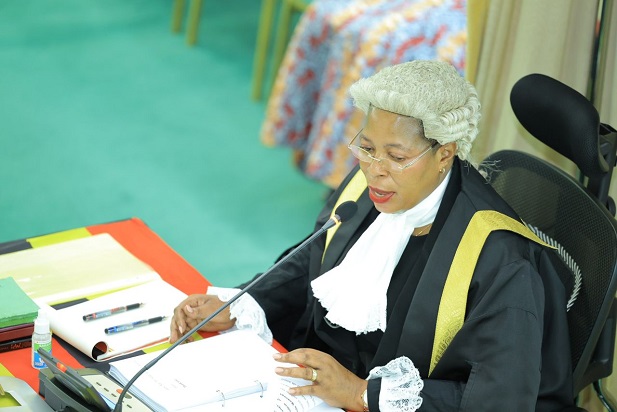Speaker Anita Annet Among
The head of the High Court Anti-Corruption Division, Justice Lawrence Gidudu, has ordered the Chief Magistrate to expedite the processing of Lawyer Male Mabirizi’s complaint accusing Speaker Anita Among of money laundering and to determine its substance within three months.
The order follows an appeal by Mabirizi after the Chief Magistrates Court dismissed his privately instituted criminal charges against Speaker Among.
On August 15, 2023, Mabirizi submitted a letter to the Chief Magistrate of the Anti-Corruption Court, accusing Among of acquiring properties through corrupt means between 2016 and 2023. These properties include a palatial residence on Mackinnon Road, Nakasero, Kampala Central Division; a residential house in Ministers’ Village, Ntinda, Nakawa Division; Sky Hotel International, a 3-star hotel at Kyaddondo, plot 1423, Ntinda, off Naalya Road, Mugisha Road, Nakawa Division; a palatial upcountry residence in Aereere Village, Kamutur Sub County, Bukedea District; a Toyota Land Cruiser V8 (Registration Number UBJ 005U); Mercedes Benz vehicles with personalized registration numbers AAA 1 and AAA 2; and a Range Rover with the registration AAA 3.
In his case, Mabirizi requested that the court summon Speaker Among to take a plea, be charged, and be tried for money laundering on allegations of defrauding taxpayers. Initially, the case was registered as number 89 of 2023 but was later changed to Miscellaneous Cause number 004 of 2024.
On March 7, 2024, the Chief Magistrate dismissed the case, citing a lack of jurisdiction and insufficient evidence to establish a prima facie case against Among. Dissatisfied with the dismissal, Mabirizi appealed to the High Court, arguing that the Chief Magistrate had erred in changing the case registration number, claiming lack of jurisdiction, and not committing the case to the High Court. He further asserted that the complaint or supporting affidavit disclosed prima facie evidence of money laundering against Among. Mabirizi asked the High Court to overturn the Chief Magistrate’s decision and grant his requests. On Tuesday, Justice Gidudu ruled that the Chief Magistrate erred in converting Mabirizi’s complaint from a criminal case to a miscellaneous application. He further noted that the Chief Magistrate incorrectly placed the burden of proof on Mabirizi to support his complaint with evidence, contrary to legal procedure. The court clarified that a complaint does not require attachments or proof to validate allegations under the Magistrates’ Court Act.
Justice Gidudu emphasized that the magistrate must inquire into the complaint, potentially consulting with local authorities or directing police investigations. “It is clear that in her ruling of March 7, 2024, the Chief Magistrate placed a duty upon the appellant/Mabirizi to support his complaint with evidence, yet it is the duty of the court to inquire into the complaint from either a local chief or the police before determining if prima facie the commission of an offense has been disclosed or not,” Justice Gidudu stated.
The judge explained that if the Chief Magistrate is satisfied that the charges are not vexatious or frivolous, formal charges should be drawn up, and the case should proceed with a plea-taking session following a summons or warrant of arrest. Alternatively, the case could be transferred to the court with the appropriate jurisdiction by way of committal.
While the court dismissed Mabirizi’s argument that the Chief Magistrate had jurisdiction to try the case, it allowed the complaint to proceed. The Anti-Money Laundering Act grants jurisdiction to the High Court, but the Chief Magistrate must still process the complaint and determine if there is sufficient evidence to warrant charges. The case has been referred back to the Chief Magistrate for processing, with instructions to expedite the process and determine its substance within three months from the date of the judgment.
-URN





